American History X Movie Review
Source: The Freedom Site, http://www.freedomsite.org/colum/promajority5.html
A Description and Analysis of the Film
American History X
by Promajority
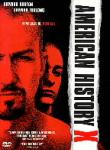
Starring:
Derek - Edward Norton Danny - Edward Furlong
Bob Sweeney (Black Principal) - Avery Brooks
Murray (Jewish history teacher) - Elliott Gould
Cameron Alexander (Adult neo-nazi Leader) - Stacy Keach
Lamont (Benevolent Black inmate) - Gary Torey
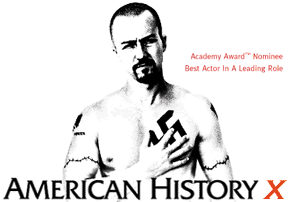
A couple of months ago I wrote a review of the made-for-tv movie White Lies which was last aired by the Canadian Broadcasting Corporation (CBC) in August of 1999 (the premier was in March of 1998 and is now available in video stores). Shortly after, I viewed the film American History X, with no intention of writing yet another detailed description and analysis, but I could not resist. I was prompted to write by the similarities that I noticed between the two films. Both contained:
-the twisting of reality in the service of a “progressive” cause.-a controversial essay near the beginning.-the portrayal of White people as gullible and easily manipulated by “misinformation” promulgated by charismatic “bigots.”-a main character who, through deception, is rapidly transformed from being naive and innocent into a prominent neo-nazi/skinhead activist.-a reversal and atonement for this neo-nazi/skinhead association.-a link, or continuum, established between well-articulated and justifiable White racial frustration and neo-nazism/skinheadism.-crude attempts to shock the audience with exaggerated scenes involving violent Whites who batter, kill and/or severely abuse minorities.-questions raised and dropped, which if stressed, would have made the story more true-to-life and insightful.
White “bigotry,” either in a current or historical context, is a favourite Hollywood theme. The films they churn out frequently portray society as “dominated” by a cruel caste of Whites who are grotesquely unfair towards minorities. These “victimized” minorities are presented as tolerant, open, understanding, calm, gentle and virtuous. In contrast, Whites are portrayed as brutally insensitive, oppressive, intolerant, hateful, violent, greedy, narrow-minded and destructive. These films show how the mean spiritedness of White Gentiles deeply hurts angelic minorities, who are at a loss to understand such raw hatred. Frequently, they feature a benevolent minority with tremendous patience and moral conviction who seeks to exorcise the poisonous racism demonstrated by the White characters (the very preachy Guess Who’s Coming to Dinner starring Sydney Poitier is a shining example). The hypocrisy of reinforcing such crude racial stereotypes, when the prime message of these preachy films is that stereotypes should be eliminated, is seemingly lost on those who make them.
A key element of this film genre is that the White Majority cannot be trusted. Those who make such films seek to demonstrate that although Whites on the surface might appear civilized, there is a latent racial barbarism that can be aroused through manipulation. This is particularly evident in American History X and White Lies, where the main characters are both young, bright, and filled with potential, yet they still somehow mange to be recruited into the neo-nazi/skinhead movement. The message is that any White person, no matter how normal, can quickly cross the line from being civil into being consumed by racial fanaticism, violence and hatred.
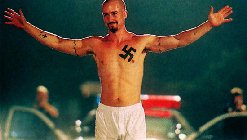
The Robbery & The Hitler Essay
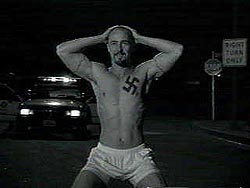 We are introduced to Derek Vinyard (Edward Norton) and his brother Danny (Edward Furlong) during a robbery attempt at their home. The thieves, members of the Crip gang, are trying to break into Derek’s truck. Danny awakens and notifies his brother who is in the midst of having sex with his girlfriend. Derek gets out of bed and exposes a beautifully-built physique which supports a large swastika tattoo on left side of his chest. He pulls out a gun and goes outside on a shooting rampage against the thieves. (It is difficult not to be reminded of a dramatic shooting scene early in the film Dirty Harry, where Clint Eastwood exits a diner to bust up a robbery in progress. Interestingly, the victims are also Black.)
We are introduced to Derek Vinyard (Edward Norton) and his brother Danny (Edward Furlong) during a robbery attempt at their home. The thieves, members of the Crip gang, are trying to break into Derek’s truck. Danny awakens and notifies his brother who is in the midst of having sex with his girlfriend. Derek gets out of bed and exposes a beautifully-built physique which supports a large swastika tattoo on left side of his chest. He pulls out a gun and goes outside on a shooting rampage against the thieves. (It is difficult not to be reminded of a dramatic shooting scene early in the film Dirty Harry, where Clint Eastwood exits a diner to bust up a robbery in progress. Interestingly, the victims are also Black.)
We are then shifted to a meeting between Murray (Elliott Gould), one of Danny’s teachers who is Jewish, and Bob Sweeney (Avery Brooks), the school’s Black Principal. The two are in Principal Sweeney’s office discussing an essay Danny has written that refers to Adolph Hitler a “great civil rights leader.” (Interestingly, here we have two minority member deciding what a White Gentile should be permitted to write, which is not far removed from reality.) The Principal, sounding very much like a Preacher, responds to the teacher: “This is racist propaganda, this Mein Kampf psychobabble. He learned this nonsense somewhere Murray and he can unlearn it too. I will not give up on this child yet!” Murray, for reasons which will become obvious later in the film, does not share his optimism.
At the conclusion of the meeting Danny is called into the Principal’s office. Then we discover that his brother Derek has been put in jail for the shootings we witnessed in the opening scenes. Principal (Pastor?) Sweeney appoints himself Danny’s history teacher (moral vanguard?) and names this one-student class American History X. Danny is assigned an essay which is due the next day, and the subject is his brother Derek. He is required to “analyze and interpret all of the events surrounding Derek’s incarceration, how these events helped shape his present perspective on life in contemporary America, the impact on his own life,” and so on. He must finish this essay by the next morning or be expelled from school. (Note: In the White Lies film, the Catherine Chapman character submitted an essay titled Christmas is Dead, which was also considered too politically incorrect. Chapman received a failing grade and turned down an offer for a re-write.)
Derek’s release from prison is cause for concern by local police. For this reason Principal Sweeney is summoned to the police station. He and he and a number of officers are shown watching a tv interview that Derek gave after his father, a firefighter, had been murdered. Derek, crying, is claiming that the murder was “race related” since it was committed by two Black addicts residing in a crack house that had caught fire. Derek rants against AIDS, minority crime, welfare, etc., articulating all the key areas of political incorrectness and clearly establishing himself as a quintessential “bigot” (a more extreme and younger “Archie Bunker”).
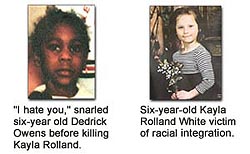 In real life, when the killer is White and the victim is non-White, there is usually speculation, if not insistence, that the murder is “racially motivated.” When the victim and victimizer are reversed (Black on White), attempts are made to minimize, if not deny, the racial dimension (i.e. it’s a function of “poverty” or “gun control.”). Even when Black-on-White murders and/or beatings are blatantly motivated by racial hatred, the White people courageous enough to point this out are either ignored, refuted, or deemed to be “racist.” A film featuring a young Black man sobbing over the murder of his father by two White men would have attempted to elicit sympathy from the audience, even if he had expressed animosity towards Whites. This animosity would have been deemed justifiable given the circumstances. Derek, however, is portrayed as a bigot because he (a White person) is playing the race card; something only “oppressed” minorities are permitted to do in our politically correct society. So instead of feeling sorrow for Derek’s loss, we are made to feel angry towards him.
In real life, when the killer is White and the victim is non-White, there is usually speculation, if not insistence, that the murder is “racially motivated.” When the victim and victimizer are reversed (Black on White), attempts are made to minimize, if not deny, the racial dimension (i.e. it’s a function of “poverty” or “gun control.”). Even when Black-on-White murders and/or beatings are blatantly motivated by racial hatred, the White people courageous enough to point this out are either ignored, refuted, or deemed to be “racist.” A film featuring a young Black man sobbing over the murder of his father by two White men would have attempted to elicit sympathy from the audience, even if he had expressed animosity towards Whites. This animosity would have been deemed justifiable given the circumstances. Derek, however, is portrayed as a bigot because he (a White person) is playing the race card; something only “oppressed” minorities are permitted to do in our politically correct society. So instead of feeling sorrow for Derek’s loss, we are made to feel angry towards him.
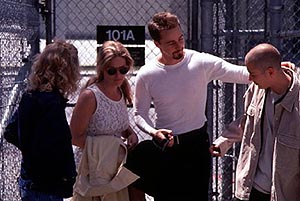
Derek’s Release & Danny’s New Essay
 We see Danny walking home from school and lamenting that his neighbourhood (Venice, California) has rapidly and radically changed. He clearly does not like what he is observing. His environment, which was predominantly White, has become multiracial. This means there are now turf wars (i.e. neighbourhood tribalism) and a much higher level of tension which is hardly the kind of “enrichment” multiculturalism is supposed to offer society. His negative reaction is not unlike that of many other members of the White Majority who have had similar transitions in their neighbourhoods.
We see Danny walking home from school and lamenting that his neighbourhood (Venice, California) has rapidly and radically changed. He clearly does not like what he is observing. His environment, which was predominantly White, has become multiracial. This means there are now turf wars (i.e. neighbourhood tribalism) and a much higher level of tension which is hardly the kind of “enrichment” multiculturalism is supposed to offer society. His negative reaction is not unlike that of many other members of the White Majority who have had similar transitions in their neighbourhoods.
On this day Derek has been released from prison. Principal Sweeney calls Derek and expresses his concern about the Hitler essay Danny wrote. Derek shares the Principal’s concern and then lectures Danny about what he has written, thus indicating that he (Derek) has changed his views (The change in Derek is ironic since it is more likely that a prison experience will make White people more, not less, racist.).
Shortly after this, Danny is at his computer and starts writing the essay assigned by Principal Sweeney. He has been asked to analyze the events surrounding Derek’s incarceration and it is through the medium of Danny’s essay that we see the rest of the story portrayed in the film. .
Shock Scenes: The Grocery Store, Dinner, and the Shooting Revisited
The first stop in Danny’s retrospective endeavour is a brutal scene designed to shock the audience. (Note: In White Lies the main “shock” scene features the bombing of a synagogue by pro-White activists in which a cleaner is shown burning in flames rolling down the steps). Derek is seen sitting in a car with an adult neo-nazi leader named Cameron Alexander (Stacy Keach) 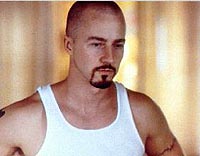 who appoints Derek to lead the “frustrated kids” who, according to Danny’s recollection, are getting “their asses kicked by the Black and Hispanic kids.” The youth are waiting for Derek, their leader, in a parking lot near the car. Derek gives a firebrand speech to these youth, who it turns out are skinheads. He rants about the “decline of America, the open borders, the parasites,” about how decent Americans are being “given the shaft,” about how they are losing their freedom and destiny, and that a “bunch of bleeping foreigners have come in” and are exploiting their country.
who appoints Derek to lead the “frustrated kids” who, according to Danny’s recollection, are getting “their asses kicked by the Black and Hispanic kids.” The youth are waiting for Derek, their leader, in a parking lot near the car. Derek gives a firebrand speech to these youth, who it turns out are skinheads. He rants about the “decline of America, the open borders, the parasites,” about how decent Americans are being “given the shaft,” about how they are losing their freedom and destiny, and that a “bunch of bleeping foreigners have come in” and are exploiting their country.
Derek refers to the grocery store which is across the street and laments how it used to be owned by “Archie Miller,” (note the use of the name “Archie” since the spirit of “Archie Bunker” is very much contained in Derek’s rant) who is presumably White. He recites the names of those within the group who used to work there. He mentions that the store is now Korean-owned and that the new owner fired the old employees and in their place hired “40 bleeping border jumpers:”
Derek: I don’t see anyone doing anything about it, and it bleeping pisses me off. This isn’t our bleeping neighbourhood. It’s a battlefield. We’re on a battlefield tonight. Make a decision. Are we going to stand on the sidelines, quietly standing there while our country gets raped? Are we going to ante up and do something about it? You’re goddamn right we are!
Derek’s rhetoric is strong, but it expresses a sense of dispossession felt by many members of the White Majority. Open borders which will render the White Majority a minority, and White people losing their jobs to illegals who both replace workers and undercut wages, are legitimate concerns. However, it’s not long before these concerns are tarnished.
The skinheads are then shown putting nylons and ski masks over their faces. They fiercely charge the grocery store like a wild pack of animals and proceed to terrorize and beat the employees who all appear to be Hispanic. One of the cashiers has the contents of various jars are poured on her. At one point they flood her face with milk and taunt her. These brutal sequences are shot in black and white.
What the film is trying to do is associate the types of valid concerns expressed by Derek in his speech,
with pro-White fanaticism and violence. The purpose is to shame members of the White Majority into silence and make them believe that if they ever express similar concerns and raise the same types of questions, the inevitable result is out-of-control violence. This is a crude propagandistic tactic intended to discourage the expression of legitimate racial frustration (Note: In White Lies, the Catherine Chapman character asked some similarly provocative questions while riding home from school on a city bus, albeit they were much lighter in both substance and tone than Derek’s in his intense and often crude speech.).
It’s also significant that it is skinheads ambushing a Korean-owned grocery store, when the the real life tension in the U.S. exists between Asian grocery store owners and some African-Americans who resent having them in their neighbourhoods. Hollywood seems to know no boundaries when it comes to distorting truth in the service of a “progressive” cause.
Danny’s next recollection is of another shocking scene. This time it’s dinner at the house, with his teacher Murray (the same one who was seen discussing Danny’s pro-Hitler essay with Principal Sweeney early in the film) as his mother’s guest (the episodes of this film are not shown in linear sequence so the dinner is taking place before Danny wrote the essay and before Derek was sent to jail). The conversation turns to the L.A. riots, Rodney King, and minority victimology. The exchanges get heated in a hurry. The teacher is very “progressive” and is sympathetic towards minorities, as are Derek’s sister and mother. It’s not long before the conversation leads to Derek’s loss of composure. He removes his shirt and in a fit of rage insults Murray, who is Jewish:
Derek: You think I’m going to sit here and smile while some bleeping kike tries to f**k my mother. It’s never going to happen Murray…I will bleeping cut your Shylock nose off and stick it up your ass before I let that happen. Coming in here and poisoning my family’s dinner with your Jewish, nigger-loving, hippie bullshit. Bleep you! Bleep you!!…Get the bleep out of my house! See this (he exposes the Swastika on his chest)? This means not welcome!!
The hysterical and violent skinhead is therefore startlingly contrasted with the rational and hurt Jew. This scene is also in black and white (Is this a hint that the issues are being over-simplified for dramatic effect?). It now that we suddenly understand why at the beginning of the film Murray did not share Principal Sweeney’s optmism that Danny could be “reformed.”
Danny’s essay now shifts well ahead of time and returns to the shooting that occurred at the beginning of the film. Derek, we now learn, wound up killing two of the thieves. One of them was ordered by Derek to open his mouth and place it along the sidewalk, and as he did this we could hear his teeth scraping against the cement. In slow motion and in black and white (obviously for dramatic effect), Derek then rams his foot on the back of the guy’s head, thrusting his mouth into the sidewalk and busting open his face. This act was so brutal that even Danny, a hard core skinhead at the time, was horrified. It is also worthy of notice that the audience is being manipulated to feel sorry for the Crips who were committing a crime, and who in real life are notorious for killing Whites. Some of these murders are the result of initiation assignments which require aspiring members to hunt down a White person(s) and kill them. Only Hollywood would portray members of such a violent gang as “victims” of brutality.
The Skinhead Party
No anti-Majority film would be complete without a skinhead gathering (Note: White Lies had a rally in a rural field that was attended by an assortment of skinheads, neo-nazis and Klansmen). Towards such a get-together Danny heads to before finishing his essay. This he does although he has promised Derek he would not go, which causes Derek to go looking for him at the gathering. Derek is no longer a part of the movement but those in attendance are not aware of this. To them Derek is an icon because of what he did to the Black thieves at his house. They give him a hero’s welcome. Eventually, Derek has a heated argument with the leader Cameron and tells him “I am done with all that bullshit out there and all of your bullshit. I’m out!” Derek accuses Cameron of preying on people and for making him lose “three years of my life for your (Cameron’s) bleeping phony cause but I am on to you, bleeping snake!” (Note: Very similar, is the sense of having been deceived and taken advantage of, felt by the Catherine Chapman character in White Lies. Chapman was “deceived” by the pro-White group NIM (National Identity Movement). Cameron vows to kill Derek and Derek beats him unconscious.
As Derek is leaving the scene, the skinheads, realizing what he has done, turn on him. He is forced to flee. Later on Danny catches up with Derek. He explains what has caused him to renounce his “racist” views. He relates how his racial “rehabilitation” started in prison. Derek describes how he allied himself with the neo-nazi prisoners but that this association soured. He became disillusioned because the apparent division along racial lines was more of a facade than reality. He observed that inter-racial commerce was taking place between the racial factions. This included a fellow neo-nazi purchasing drugs from Hispanic prisoners only to sell them at profit to White prisoners. (Note:White Lies also features a prison scene where Catherine Chapman visits a NIM activist in prison. He tells her that he is” disillusioned” with the pro-White movement. This is ironic because a prison experience usually either reinforces or arouses racial awareness.)
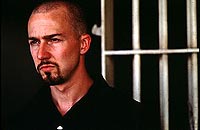 Another key event was Derek’s bonding with a Black inmate named Lamont, with whom he is paired for the purpose of folding laundry. Lamont is friendly, and possesses a sharp sense of humor. He is also kind enough to give Derek some friendly advice about how to conduct himself in prison. At first Derek is cool towards Lamont, but he is eventually won over and the relationship plays a major role in Derek’s racial “rehabilitation.”
Another key event was Derek’s bonding with a Black inmate named Lamont, with whom he is paired for the purpose of folding laundry. Lamont is friendly, and possesses a sharp sense of humor. He is also kind enough to give Derek some friendly advice about how to conduct himself in prison. At first Derek is cool towards Lamont, but he is eventually won over and the relationship plays a major role in Derek’s racial “rehabilitation.”
Derek is shocked to discover that the benevolent Lamont is in prison for six years for stealing a tv while looting (during the L.A. riots, perhaps?) and allowing it fall on the arresting officer’s foot. It fell because the officer grabbed the tv from Lamont’s hand thus releasing it from his grip. The seemingly lengthy sentence was given because he was deemed to have “assaulted” an officer, even though it was the officer’s actions which had led to the tv falling on his own foot. Derek got a mere three year sentence - half of what the Black inmate got - for actually killing two people. The obvious implication is that the justice system - both law enforcement and the courts - favours Whites and unfairly punishes Blacks by giving them stiffer sentences for lesser crimes - of which they might not even be guilty. Derek is jolted into realizing just how unfair White society is towards Blacks.
Derek is transformed from the hard core racist who would not even speak to Lamont when they started folding laundry together. He even begins to to play basketball with the Black inmates. By allowing Derek to play with them the Black prisoners demonstrate their racial tolerance. The neo-nazi prisoners, on the other hand, are very upset that Derek has crossed the racial boundary. Later on they corner him in the shower, smash his face against the wall, and then he is sodomized. This extreme and violent reaction clearly indicates that the racial divide within the prison, at least according to this film, is the result of White intolerance.
After the beating, Derek awakens in the prison’s medical ward. At his bedside is his former teacher Bob Sweeney, the Black Principal we saw near the beginning of the film. Derek’s racial rehabilitation started with the Black prisoner Lamont, followed by the tolerance of the Black prisoners who allowed him to play basketball with them, and is now being continued by Principal (Preacher?) Sweeney. Mr. Sweeney is concerned that Danny is taking the same route as Derek and intends to reach out to Derek as well. Sounding very much like a Priest, he asks Derek: Has anything you’ve done made your life better? (i.e. Has your prejudicial behaviour done you any good?) Derek, behaving as a person seeking the salvation of his soul from a Holy Man, breaks down and weeps: “No. You gotta help me now. Just help me. Get me out of here!”
The bond between Derek and the Black prisoner Lamont continues to strengthen. Lamont chastises Derek for breaking ties with the neo-nazi prisoners and cautions Derek that he will now probably be targeted by other inmates (What is the likelihood that a Black prisoner would scold a White inmate for breaking away from a group of neo-nazis?). Derek acknowledges that the Black inmates will probably get him. Miraculously, he escapes the rest of his sentence without being attacked. This is yet another shining example of a White person being saved by “Black tolerance.”
Before leaving prison Derek seeks out Lamont. A sense of injustice will be felt here by the viewers of the film, because the more hardened White criminal is getting out while the kinder and gentler Black inmate must stay behind.
- Derek: I have this feeling. I’m thinking the reason I’m getting out of here in one piece is you. I owe you man!
Lamont: Man, you don’t owe me shit.
Derek: Yes I do.
As Derek walks out of prison Lamont shouts to him: “You take it easy on the brothers. The brothers!”
So, what have we got to learn from Derek’s prison experience? Derek bonds with the Black inmate, who was clearly the voice of reason, and then with the determined Black Principal (Preacher?), the voice of righteousness, who visited him in the medical ward. These Black men are depicted as highly compassionate and it is Derek’s interaction with them which leads to the racial deprogramming which re-connects him with his humanity; a humanity which was stolen from him by a couple of bigoted White men: his racist father (see dinner dialogue below), and by Cameron Alexander, the manipulative neo-nazi leader. It took two Black men to rescue Derek from the self-destructive path upon which he had embarked courtesy of the “racist” conditioning to which he was subjected by two deceptive White men.
Portraying the racial rehabilitation of a young White man in a tough multiracial prison is of course an extreme distortion of reality. The reality in American jails is radically different than what is portrayed in this film. The following is a passage from Charles Silberman’s book Criminal Violence, Criminal Justice, which was taken from David Duke’s book My Awakening (p. 147):
A young offender, particularly a white offender, is likely to be subjected to gang rape his first night in jail. In a number of large cities, jail officials automatically place young whites in protective custody for their own safety. Sometimes the move comes too late: young offenders often raped in the van transporting them to jail…[O]ne man’s defeat is another’s triumph: the ultimate triumph is to destroy another man’s manhood - to break his will, defile his body, and make him feel totally (and often permanently) degraded …and when the wolf (rapist) is black and the punk (victim) is white (the most frequent arrangement, by far) the wolf’s demonstration of power is infinitely sweeter. (Silberman, pp. 78, 118)
Return to the dialogue between Derek and Danny:
- Derek: I’m lucky. I feel lucky Dan, because it was wrong (what I did). It was eating me up. It was going to kill me. I kept asking myself: ‘How did I buy into this shit?’ It’s because I was so pissed off.
The tone of the above passage sounds more like that of a born again Christian reflecting on his past sinful life before re-discovering Jesus Christ, than it does someone who just got out of prison. The passage also implies that when Whites become frustrated, or “pissed off,” as Derek claims he was, there is no valid foundation for feeling this way. Such frustration is portrayed as purely irrational hatred unleashed through the misguidance of people with closed minds (his father - see below) and manipulation of those with self-serving agendas (the neo-nazi leader Cameron). Derek’s sermon leads to the “reprogramming” of Danny also, and in the next scene both are shown enthusiastically tearing down the Nazi paraphernalia in his room. Danny, therefore, has joined Derek by also re-acquiring his status of a human being. They are purging (exorcising?) his room of the past evil which used to dominate both of them.
Dinner With Dad
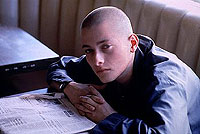 Because the sequences of this film are not linear in time, the scene with Derek’s father at the dinner table, at this point, as described in Danny’s essay, is the earliest event in the whole story. Derek and Danny are now shown to have been normal boys, the complete opposite of the skinheads they become later on.
Because the sequences of this film are not linear in time, the scene with Derek’s father at the dinner table, at this point, as described in Danny’s essay, is the earliest event in the whole story. Derek and Danny are now shown to have been normal boys, the complete opposite of the skinheads they become later on.
The dialogue starts with Derek gushing about Bob Sweeney, the Black Principal who at the time was only a teacher. Derek is admiring Mr. Sweeney’s “couple of PhD’s” and he wonders why such a “brilliant man” is teaching at his school (there are probably not too many African-Americans who hold one PhD, never mind two, so this is yet another stretch of reality). He enthusiastically informs his father that the Mr. Sweeney will be giving an exam on a book with a Black theme and that the class is studying Black literature.
Derek’s father sarcastically comments: “Is this part of Black History month?” He laments that this kind of thing - “affirmative Blacktion” - is “everywhere.” He exhorts Derek to “not swallow whole” what his Black teacher is teaching: “I mean, do you have to trade in Great Books for Black books?” (Note: Chapman In White Lies Catherine Chapman explains her perplexed state of mind similarly: “If you ask me, trading the baby Jesus in for Frosty the Snowman is a bum deal.”) The father continues: “You have to question these things, you have to look at the whole picture. You know we’re talking about a book here, but I’m also talking about my job.”
Affirmative action (“employment equity” in Canada) is a volatile issue. Derek’s father describes how two Black firefighters were hired even though they scored lower on the testing than did other White applicants: “Does that makes sense?” (Of course it doesn’t)
- Father: Yeah sure, everything’s equal now; but I got two guys watching my back responsible for my life, who aren’t as good as two other guys. They only got the job because they’re Black, not because they were the best.
Derek: That sucks.
Father: Yeah. Is that what America is all about? No, America is about best man for the job. You do your best, you get the job. You know, this affirmative action crap, I don’t know what that’s about, it’s like some hidden agenda or something going on. You see what I’m saying?
Derek: Yeah I do. I don’t know. I didn’t think about it like that.
The father of the two protagonists shows his “true colours” by referring to the Black teacher’s views as “nigger bullshit” and cautions his son Derek that he “has to watch out for that.” Derek replies: “Yeah I know. I get what you’re saying. I will.” A wide-eyed Danny is then shown. He seems to be stunned by what he has heard. Although Derek’s father was making some valid points, his “nigger bullshit” comment and other crude hits indicate that his views are motivated less by a concern for fairness than by feelings of raw hatred. The film is trying to get across that although diatribes against affirmative action and other “racially sensitive” issues might sound well-argued and reasonable, in the end they are essentially motivated by “bigotry.” The strongly implied conclusion is that opposition to measures that purport to “assist” minorities, no matter how unfair they might be towards the White Majority, is “racist.”
The dialogue during dinner is highly contrived and borders on being silly. The father more plausibly could be a visiting uncle with whom Derek was not acquainted. Had the father been drilling “racist” ideas into Derek’s head prior to the dinner conversation, why would Derek be raving about his Black teacher and be excited about reading a novel with an African-American theme? And the look of shock on Danny’s face also indicates that the father was saying something that he was not accustomed to hearing. Both Derek and Danny were transformed from being not the least bit racist to being fanatically racist within an extremely short period. At the dinner table Derek did not appear to be much younger than when he did the TV interview where he was asked to comment on the death of his father. Hence, Derek was transformed from admirer of his “brilliant” Black teacher, to fire-breathing racist, within an extremely short period.
What are the odds that the father had successfully hidden his racist views from his children for so long only to have them suddenly come pouring out at a time when one of his sons was well into his high school years? How could such a brief exchange successfully counter the years of multicultural and anti-racist (read: anti-White) conditioning to which Derek had been subjected in school and elsewhere?
This dinner scene reinforces the crude stereotype that White people “learn racism,” and that it is based on nothing but bigoted opinions held by narrow-minded White people who perpetuate lies and misleading stereotypes about minorities. It implies that White “racism” is based upon nothing but a web of false rumours that spread like a plague when intercepted by innocent and naive White ears. Some of what the Progressive-minority coalition cite as “racism,” however, is actually frustration that has developed through experience with issues such as affirmative, high levels of minority crime, immigration, the radical transformation of neighbourhoods, racial double standards, censorship, and so on. Films such as American History X attempt to make us believe that such concerns are simply mental poison that is inherited through casual discussions, particularly during exchanges between “bigoted” parents and innocent children at the proverbial “dinner table.”
In reality, what is referred to as “White racism” might often be the result of Whites feeling resentful (and rightly so) of very real, very actual pro-minority (anti-Majority), pro-multicultural (anti-European) and “anti-racist” (anti-White) propaganda that contains more than its own share of falsehoods, and which also goes to great lengths to demonize the White Majority. American History X, not surprisingly, portrays the very opposite. It shows Derek and Danny becoming neo-nazis/skinheads not because of what they had experienced themselves, but through the influence of their bigoted father and a slick neo-nazi leader, both of whom passed on all their “wrong” beliefs and warped mentalities. This is yet another stunning example of reality being twisted in the service of a “progressive” cause.
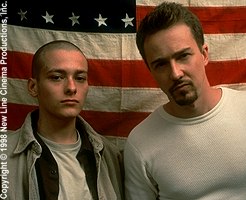
Both American History X and White Lies implicitly preach that if you are part of the White Majority and feel racially frustrated, you have to either remain silent and accept the inevitability of change and supposed social “progress,” or express your frustration and risk becoming sucked into a neo-nazi/skinhead cult. There is seemingly no middle ground. This is of course ludicrous, being simply a crude propagandistic attempt to both intimidate and shame the White Majority into silence.
One curious development in American History X occurs towards the end when Danny is shot in the washroom of his high school by a Black student with whom he had had a run-in early in the film, presumably in the same washroom. So it turns out, both Derek’s father and his brother have been shot by Blacks, which may be a warning to those who practice “extremism” in words or actions. Danny, although he is dead, concludes his essay with what he has finally “learned.” In a voice-over he states: “Hate is baggage. Life’s too short to be pissed off all the time. It’s just not worth it.” He ends the movie with an “inspirational” quotation: “We are not enemies, but friends. We must not be enemies, though passion may have strength, it must not break our bonds of affection. The mystic cores of memory will swell and again and touch as surely they will be by the better angels of our nature.”
Conclusion
It has been suggested that American History X is in some ways a pro-White film. A friend cited as evidence Derek’s speech to the skinheads before they ambushed the Korean grocery store, some of the father’s insightful refutations of affirmative action during dinner, and the portrayal of racial tension in Danny’s neighbourhood. Also cited were the murders of Derek’s father by a couple of Black crack addicts, and his brother Danny by a Black student. Even film critic Robert Ebert was surprised at the effectiveness of what he called the film’s “White supremacist” rhetoric.
It’s too simplistic to cite the inclusion of these scenes as some sort of breakthrough in notoriously minoritycentric Hollywood. The rest of the film, as this review has demonstrated, is so overwhelmingly anti-White that it’s a major stretch to claim that it is actually “sympathetic” to the pro-White cause. The fact that it showed some things that aren’t usually seen in these types of films should not generate too much excitement, nor hope. The film’s “shock” scenes probably had a much greater impact on the average viewer than any of the others.
I believe the film, as did White Lies, is letting us know that they (the Progressive-minority coalition) realize that multiracialism is not all it’s cracked up to be, but that the White Gentile Majority, despite its sometimes justifiable frustration, should never consider doing anything about it. The message is that we’re supposed to remain silent and frustrated, and that if we decide otherwise we’re inevitably going to become involved in a neo-nazi/skinhead cult which will only worsen our situation. They appear to be telling us that there is no reasonable or civilized means of White protest, so don’t even try. The film is creating the impression that we’re ostensibly trapped in a situation which is probably not fair towards the White Majority (racial double standards, job quotas, an Afrocentric school curriculum, a neighbourhood dominated by racial turf wars, the murdering of family members by Blacks), but that we have no choice but to accept it. In other words, get used to it or suffer even worse consequences.
Were the murders of Derek’s father and brother by Blacks an example of these inevitable consequences, or were they designed to arouse White protest? To me the answer is painfully obvious.
